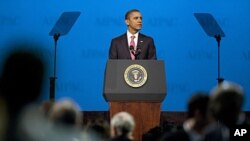President Barack Obama says the United States will use every element of its power, including military force if necessary, to prevent Iran from developing a nuclear weapon. Mr. Obama addressed the largest pro-Israel group in the United States on Sunday on the eve of his meeting with Prime Minister Benjamin Netanyahu.
Mr. Obama mixed strong language about Iran's nuclear program with an appeal for more time to allow sanctions and diplomacy to turn Iran's government away from developing a nuclear weapon.
Watch Michael Bowman's related report:
No Israeli government, he said, "can tolerate a nuclear weapon in the hands of a regime that denies the Holocaust, threatens to wipe Israel off the map, and sponsors terrorist groups committed to Israel’s destruction."
As president, Mr. Obama said he has a "deeply-held preference for peace over war" and will only use force when "the time and circumstances demand it." But to long applause from the American Israel Public Affairs Committee, he said Iran's leaders should not doubt the resolve of the U.S. or Israel. “So we all prefer to resolve this issue diplomatically. Having said that, Iran’s leaders should have no doubt about the resolve of the United States, just as they should not doubt Israel’s sovereign right to make its own decisions about what is required to meet its security needs," he said.
Mr. Obama repeated that he takes no options off the table in the effort to prevent Iran from developing a nuclear weapon. Again to loud applause from the AIPAC audience, he made clear that military force remains an option along with the political, diplomatic and economic efforts being applied. "And yes, a military effort to be prepared for any contingency. Iran’s leaders should understand that I do not have a policy of containment, I have a policy to prevent Iran from obtaining a nuclear weapon," he said.
But Mr. Obama said sanctions have succeeded in slowing Iran's nuclear program, "virtually grinding the Iranian economy to a halt" and dividing its leadership, and noted that Iran faces the prospect of even more crippling sanctions.
The president said both the U.S. and Israel assess that Iran does not yet have a nuclear weapon. The international community, he added, has a responsibility to use the "time and space" that exists to persuade Iran's leaders to make the right decision rather than "continue down a dead end." Mr. Obama criticized what he called "loose talk of war," and said now is not the time for "bluster."
Before President Obama spoke, Israel's president, Shimon Peres, addressed the conference, thanking Mr. Obama for being a strong friend of Israel.
Calling Iran's regime "evil, cruel and morally corrupt" and a danger to Israel and the world, Mr. Peres said Israel prefers peace but will fight if necessary. He added that the U.S. and Israel are united in their commitment to prevent Iran from acquiring a nuclear weapon. "The United States and Israel share the same goal to prevent Iran from developing a nuclear weapon. There is no space between us. Our message is clear: Iran will not develop a nuclear weapon," he said.
President Obama's address to the annual AIPAC conference came on the eve of his Oval Office talks on Monday with Israeli Prime Minister Benjamin Netanyahu, expected to focus primarily on Iran, along with the troubled Israeli-Palestinian peace process.
Mr. Obama and President Peres reiterated the importance of a two-state solution. They also mentioned the ongoing violence in Syria, with Mr. Obama saying upheaval in the region makes it more important to solve the Israeli-Palestinian issue.
In his remarks on Sunday, Mr. Obama hit back at Republican presidential candidates who have alleged he has been weak in supporting Israel.
He said "there should not be a shred of doubt" about that support, adding the U.S. - Israel relationship "is simply too important to be distorted by partisan politics."
| Join the conversation on our social journalism site - Middle East Voices. Follow our Middle East reports on Twitter and discuss them on our Facebook page. |





